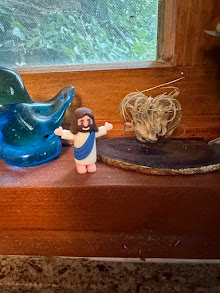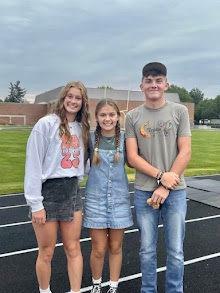This quote carries the weight of truth, whether you recognize the source as Voltaire....or Spiderman. We bandy about words like "power", "rights" and "responsibility" like we are juggling beanbags, not the heavy cornerstones of society they represent. We shouldn't use these words lightly; they are massive, weighty, burdened with meaning.
We farmers need to keep this quote in mind as we ask our neighbors across the state to vote "yes" in a couple of weeks for Amendment 1, the Right to Farm amendment. We are using the word "right", the same word we apply to freedom of speech, freedom of assembly, freedom to worship; it is no small thing to ask for a right.
Why do farmers feel compelled to ask for this right? Like the Founders who enumerated these privileges because they understood what it was to be without them, farmers are beginning to learn what it means to be denied the right to farm. To people who have learned at their parents' knees that farming is synonymous with stewardship, that the future depends on the present, that success is counted in generations, not just balance sheets, the current climate of suspicion, distrust, and animosity comes as a complete shock.
I buy my food at my hometown grocery. We buy beef from a nearby farmer and can as much of the garden's bounty each summer as we are able. When I am at home in Tarkio, I'm pretty much a locavore, buying my food within shouting distance. I neither know nor care whether my neighbors drive an hour to a different grocer (for variety), or a big box store (to save money), or to visit a truck farm or farmers' market (because fresh or organic or knowing where the food originated is tops on their list). I believe in the rights of my neighbors to buy the food they want to eat where they wish, based on the criteria important to their families. Our daily bread, in this rich rich country of ours, comes from a cornucopia of options.
Not everybody is satisfied with this situation. Some people believe that people ought not to choose what they eat; they should eat only what is "good" for them..arbitrated by certain criteria, rather than the multi-faceted means our freedom affords us now. Never mind deciding what to eat by speed or ease or proximity or economy, or any other way consumers vote with their food dollar. There is a narrow moral component in this argument, a right and a wrong way to eat that goes against the grain of American individualism in a way that is at odds with the prevailing winds of this modern society.
The food police are not content to shout atop their soapboxes on the street corners of America. No, they have carried this fight to the hinterlands where food is produced. They sing a song of sixpence to moms at home and chefs in restaurants, a pocket full of scientific factoids and fear and a pie of nonsensical assurances if they just eat "right". How do they plan to achieve "happily ever after?" The combined straitjackets of public opinion and regulation leave food producers gasping for air and wondering whether they are crazy...or the rest of the world is.
It is this battle that Missouri's Right to Farm joins. On the side of agriculture are farms of all sizes, growing everything from acres of grain to beefsteaks and bacon on the hoof to wines for fine dining to perishable herbs and greens peddled hand to hand at farmers' markets. A huge number of the farms you see sporting those orange and white Amendment 1 signs are like our farm....multi generational family businesses that not only work together but see each other at birthday parties, tball games, and church. Farms begun by a mom and a dad, who raised some kids there in mud and dust, good times and hard times. Maybe some kids came back, to work the same land....and expand the business because that meant a good life for growing families and the communities they belonged to. With hard work and good fortune, maybe this family farm was able to welcome grandkids...and great grandchildren as well. The lettered roads of our state are home to many farms with the century sign in the yard and the legacy of success and sacrifice it represents. This agriculture is what I know, what our family represents, and what is threatened by nay sayers with the notion that they can not only predict the behavior of a business by its size, its practices and its business organization, but foresee what will be necessary to meet the future needs of a hungry planet.
Why does agriculture need this special protection? Why not shoe stores or ice cream shops or body shops or hair dressers? Because agriculture is so land dependent: what affects the land envelops agriculture like a blizzard. The threat could be a listing of a new endangered species; a change in water rights or the interpretation of a regulation; a decision about greenhouse gases.Or it might be a vote to outlaw GMO crops.
And agriculture employs such a small number of operators. We farmers hear ad nauseum the statistic that we are but 2 percent of the population of the US and that we feed the other 98 percent as well as ourselves. This is asymmetry on steroids and we farmers know that even our best PR efforts are but a thumb in the dike of overweening ignorance, if not antagonism. I wish I could take every skeptic to work with me for a day, to see how we live with, in, surrounded by and dependent upon the soil, sky, water, and people of our immediate environment. My kids rolled in, dug in, and lost their boots in the earth and mud of our home place. We drank the water from the wells in the midst of our crops...and still do. Farmers do their best to avoid utter failure, but nothing can make growing plants and animals cookie cutter, turn key, or risk free. The pejorative use of the term "industrial'' cannot change the essential earthiness of farming. Successful agriculture is a business....but it is an "exceptional" business, surviving and thriving because it is family based. A vocation in farming is a life of risk, rarity, and vitality. It is not easy and no one prescription can ensure a food supply that will meet all needs, desires and avoid every newsworthy pitfall of the moment. We need flexibility to solve not just the problems of today, but those that lie in the unseen and unforeseeable future.
As a mom and now a grandmother, my experiences place me smack dab in the middle of five generations of rural life in Atchison county. My husband's grandfather lost a farm in the Depression, shucked corn by hand, and finally drove an eight row combine until he could no longer climb the steps. His son and wife raised three sons to plant it, weed it, feed it, and fix it yourself when it breaks. We came back to this during some tough times, built greenhouses after hours, and now welcome another generation to work and raise their families. This story is not unique; rather it is the chapter and verse of Missouri farming. Amendment 1 cannot enshrine agriculture in a glass bubble, but it will assure Missouri farmers that they can hope and plan for the future of their farms and their families on the land they love.




.JPG)






























What does the actual language of the bill say? It says "subject to duly authorized powers, if any, conferred by article VI of the Constitution of Missouri." That language means that any governmental body in Missouri can outlaw the Right to Farm amendment. You've been taken.
ReplyDeletehttp://ballotpedia.org/Missouri_Right-to-Farm,_Amendment_1_%28August_2014%29
Tom, Agriculture is certainly subject to the statutes and regulations of the state of Missouri. For instance, there are laws on the books that curtail corporate and foreign ownership of Missouri farmland.
DeleteIf the voters of Missouri approve Amendment 1, it will signal their endorsement of farming and agriculture as an important and valuable part of the state's economy and society. This vote of confidence might make it less likely that Missouri will again be the target of out of state anti agriculture groups in the future.
This comment has been removed by the author.
ReplyDelete